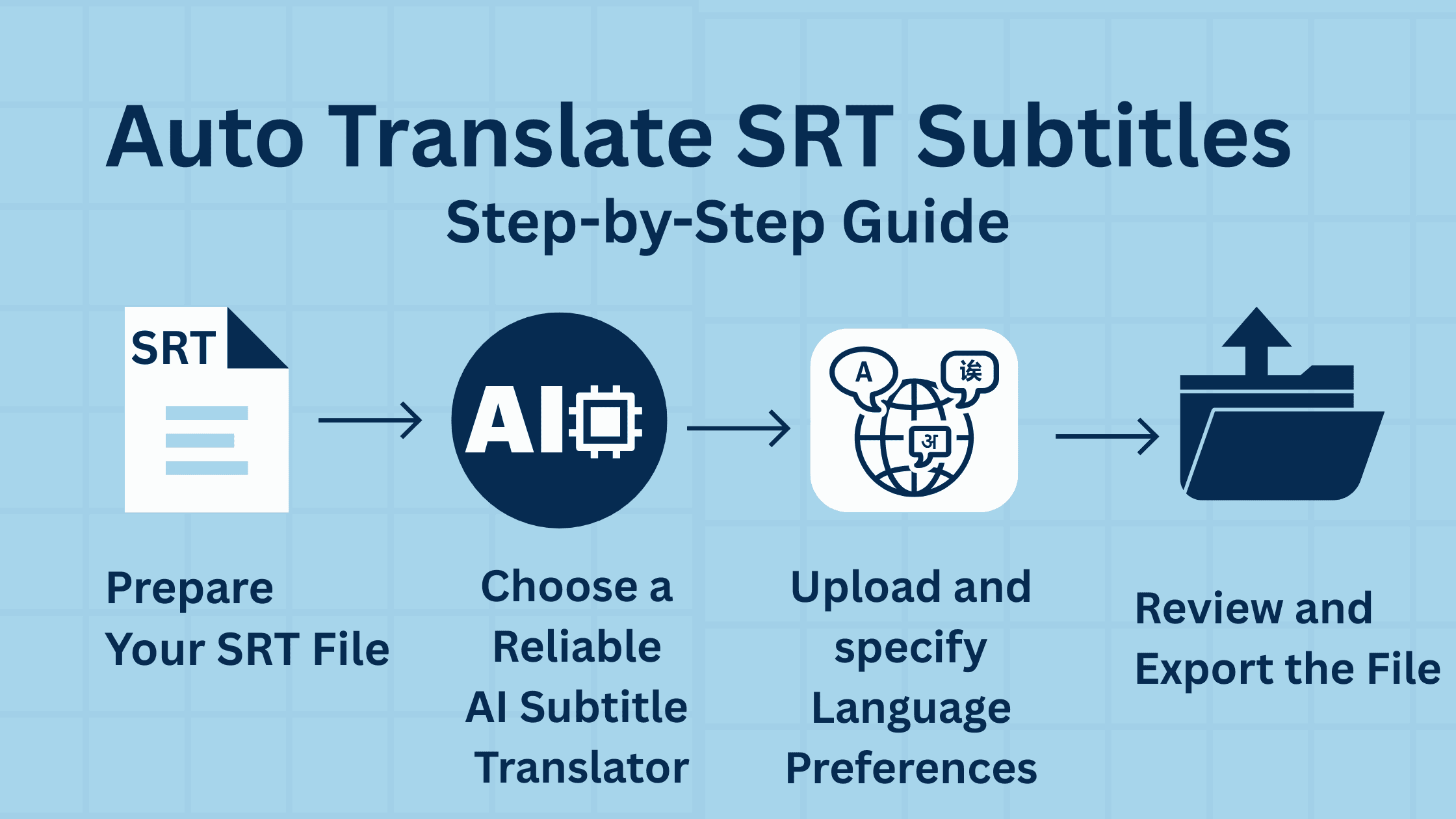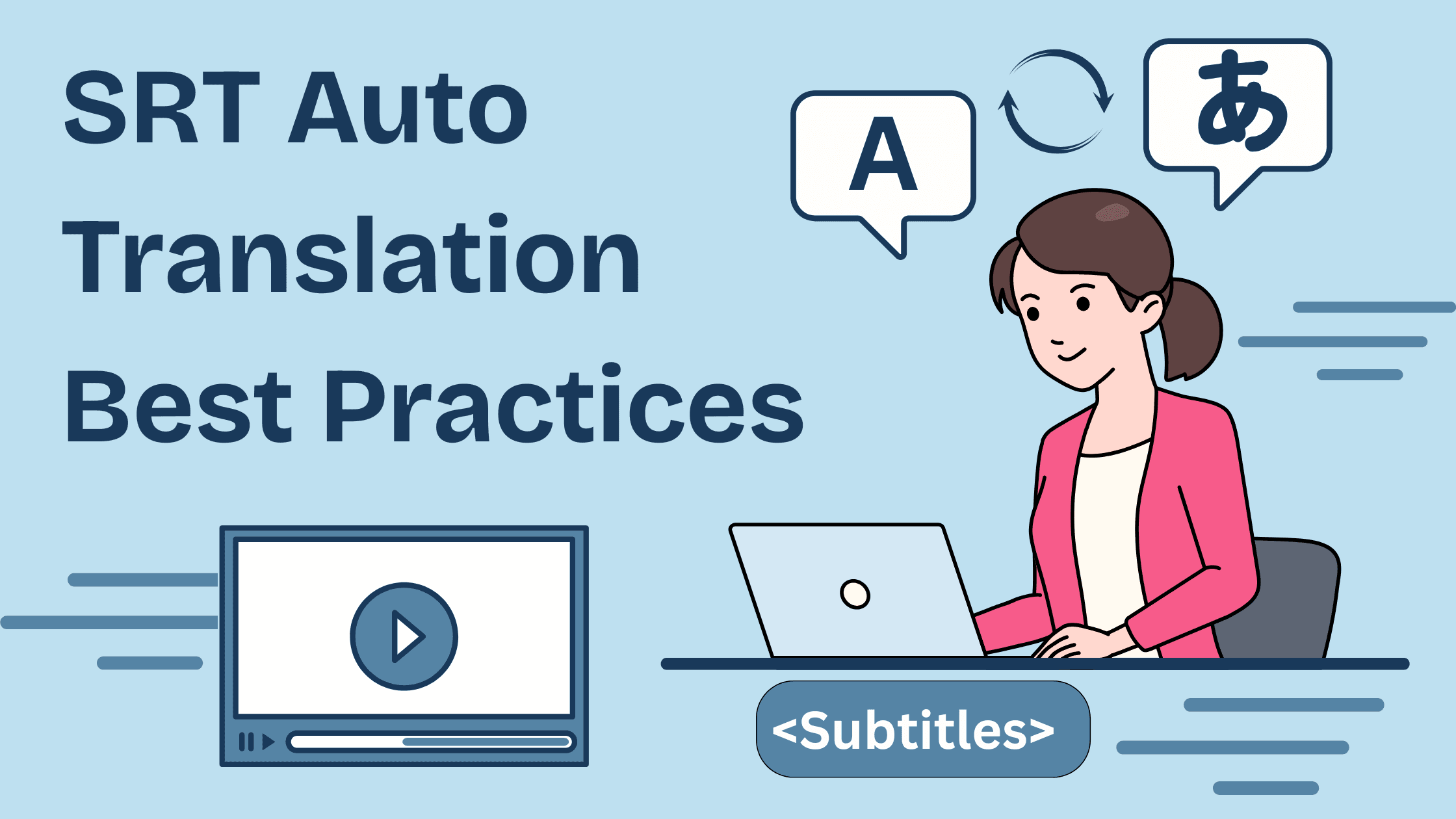Auto translate SRT with AI-Powered Solutions

The Need for Subtitle Translation
In today's global digital landscape, Video content is a core stuff for communication, education, entertainment and marketing in a current global digital landscape. However, though visual content appears to be enticing, the barrier of language prevents from reaching the wider, truly global audience. This is when SRT subtitle files come into play, delivering a powerful way to communicate across languages. Manual translation of SRT subtitles, however, is a time-consuming and error-prone activity. The intelligent way out? Auto translate SRT through advanced AI tools meant for streamlining the subtitle localization process effectively and accurately.
The Issue of Manual SRT Translation
Simply translating SRT files into another language has more to it than converting text. Each line must contain the precise time source and should not miss balancing the aspects of context, grammar, and tone. With multilingual projects, this becomes quite big. One would expect hours or even days to complete the task for one video, given the language proficiency, cultural awareness, and subtitle editing that all editors need. This makes the whole process unscalable for content creators, educators, and marketers who want to localize content regularly. Hence now, there are more people looking for ways to auto-translate SRT files through AI solutions that are reliable.
Manual translation also brings about the risk of inconsistency, particularly in situations where several translators are involved. Phrasing may differ; tone may change altogether, and formatting may all be misaligned. Even a tiny error in timecodes can destroy the entire experience making subtitles appear too soon or too late. On the contrary, AI-powered solutions furnish all clients with excellent translation that is unified and consistent and keeps formatting integrity especially useful when publishing to platforms like YouTube or Netflix.
The Power of AI in Subtitle Translation
AI has changed the face of how we perform translation tasks completely. With the help of such large language models and other machine learning systems, you can easily translate SRT subtitles in seconds. These AI systems can understand not only the text but also tone, timing, and even the cultural nuance. Whether you're dealing with a training video, movie subtitles, or international advertising campaigns, SRT auto translate via AI tools can help you reach a wider audience without compromising on quality or speed.
These tools are constantly learning and adapting. With the help of neural networks and deep learning, translation engines are getting better at recognizing idioms, colloquialisms, and emotional tone elements that traditional translators often struggle with. You also get the flexibility to choose formality levels or domain-specific translation modes (like legal, technical, or conversational), enhancing the personalization of your content.
Step-by-Step Guide to Auto Translate SRT Subtitles

Step 1: Prepare Your SRT File
The subtitle file must be in standard SRT format. Each entry must contain the number, start and end time, and subtitle line. If it is badly styled, it may be hard for AI tools to explain it. Use tools like Subtitle Edit and Aegisub to remove all formatting issues before uploading.
Step 2: Choose a Reliable AI Subtitle Translator
Hunt for a platform that has all the possibilities of auto translating SRT subtitles. Some of these are:
GTranslated Subtitle Translator Tool
DeepL
Google Cloud Translation API
Amazon Translate
Kapwing
Ensure your tool would work with both your source and target languages. Some of them also have batch processing and cloud integration, which will be useful in larger projects. This is the practice data that you have up to October 2023.
Step 3: Upload and specify Language Preferences
Most tools have a very simple upload option. When uploaded, select your first language and target language. Immediately the text is processed by the AI, and translation starts. You can enable context-oriented suggestions, formal, informal tone options, or domain-specific translation within those features for purposes of more precise results. You have got access to data updated through October 2023
Step 4: Review and Export the File
After translation, you get an editable preview. The file must be verified against your goal. Save the auto translate SRT subtitle files once process is completed with the final results. It will be used with videos hereafter or uploaded into YouTube, Vimeo, LinkedIn, or other e-learning portals.
Best Tools for Automatic SRT Translation Using AI
There are many, but not all, offer similar standards of accuracy and reliability. Some of the highly trusted names are as follows which take your SRT file to be auto-translated with high precision:
1. GTranslated SRT Subtitle Translator
An AI-powered tool especially designed for speedy, secure, and contextual translation into subtitles for dozens of languages. It is preferred for educational content and corporate material.
2. DeepL
This application specializes in high-quality translations and now provides support for various document formats, including subtitle files. The fluency it provides borders on the outstanding, especially in European languages.
3. Kapwing Subtitler
This is an easy-to-use online platform that has the feature for automatic video subtitle translations. It also has a video editor, providing a very convenient facility for all types of YouTubers and content creators.
4. Subtitle Edit + Google Translate Plugin
It is an open-source tool that can be directly integrated with a translation API such as Google Translate. It is very good for batch subtitle translation and manual corrections.
Benefits of Using AI for Auto-translating SRT files
Auto-translate SRT subtitles of using an AI application saves time and brings more consistency and coverage in different languages. Here are benefits worth going for AI in:
1. Rapid Pace Mixed with Efficiency:
A manual translator could spend a good number of hours working on 10 minutes of footage, whereas AI tools perform the task in a minimal number of seconds, giving your time-stamped subtitles in your choice of language almost instantaneously.
2. Economical for Scaling Globally
Hiring at least a few human translators would not be necessary, since an accurate output would be provided at a fraction of the cost thanks to AI. This fact makes it an all-air apple for an agency, educator, or content creator with tight budgets.
3. Multilingual Support
Modern tools have a capacity over 100 languages, with support for most regional dialects. This means that you can auto translate SRT to Spanish, French, Urdu, Japanese, or even some lesser-known languages without the hurdle of having to switch tools.
4. Better Consistency and Context
AI has understood the context of phrases through millions of sentences to maintain tone, grammar, and cultural nuance at a much better level than traditional rule-based systems.
5. Easy Editing and Updates
You can finely tweak or change translations without changing the timecodes with AI processed outputs. This means that editing is easy, clean, especially when done on tools with built-in subtitle editors.
6. Accessibility and Compliance
Because of translated subtitles, every content had become inclusive to viewers who are deaf or hard of hearing or even non-native speakers.
7. optimization for SEO and Discovery
Videos will usually rank higher in search results with subtitles in different languages. On platforms like YouTube or Vimeo, where metadata understandably plays a major role in visibility, these with subtitles often rank higher.
8. Alongside Integration with Video Platforms
The tools have many integrations with content platforms, with one-click subtitle upload option and export into formats such as VTT, TXT, or embedded soft subs.
9. Collaboration in Real-Time
Cloud subtitle translation tools permit teams from all across the globe to work on subtitle files in real-time. This is relevant in a tight deadline scenario, especially when teams are dispersed.
10. Data Privacy and Encryption
Good AI platforms ensure end-to-end encryption and are compliant with GDPR or HIPAA standards, which are prerequisites for medical, legal, or corporate content translations.
SRT Auto Translation Best Practices

Always manually verify output: No AI is perfect; a quick human verification helps ensure that everything reads nicely and in context.
Preserve the original SRT format: Don't tamper with the timecodes while translating any content except when needed. It's crucial in formatting to synchronize with video.
Keep it Short and Sweet Phrases: Long and complicated sentences, which form the majority of the cake, are difficult for AI to think through and keep up. Cut a sentence commonly improves the translation accuracy.
Saving originals: Always save the original SRT file on a different disk before any manipulation for editing, errors, or rework.
Subtitle test in your video: Play around with your translated subtitle file before making your video public.
Avoid slang and regional idioms: As AI very often hardly understands these forms without direct equivalents in other languages, avoid using such forms.
Final Thoughts on AI Subtitle Translation
The need for multilingual content will only grow in the future. So many new applications will now be possible through auto translate SRT files, whether for online education materials, training modules for employees, an international outreach campaign, or YouTube. An AI subtitle translator is perfect in matching speed, cost, and accuracy of reach, thus letting you connect more simply to audiences in their own tongue. The technology continues to become advanced with time, so these tools will become much more intuitive, thereby making language barriers a thing of the past.
Ready to Reach Global Audiences?
If you genuinely want to scale your content to international markets, then it is time to use AI for subtitle translation. Do not let language become a hindrance to your growth. Use trusted AI tools now to auto-translate SRT files and open your content to a world of new viewers. If you are a single content creator working on your own or part of a global company AI-powered subtitle translation gives you speed, accuracy and reach Try one of the suggested tools today and see how it works for you.